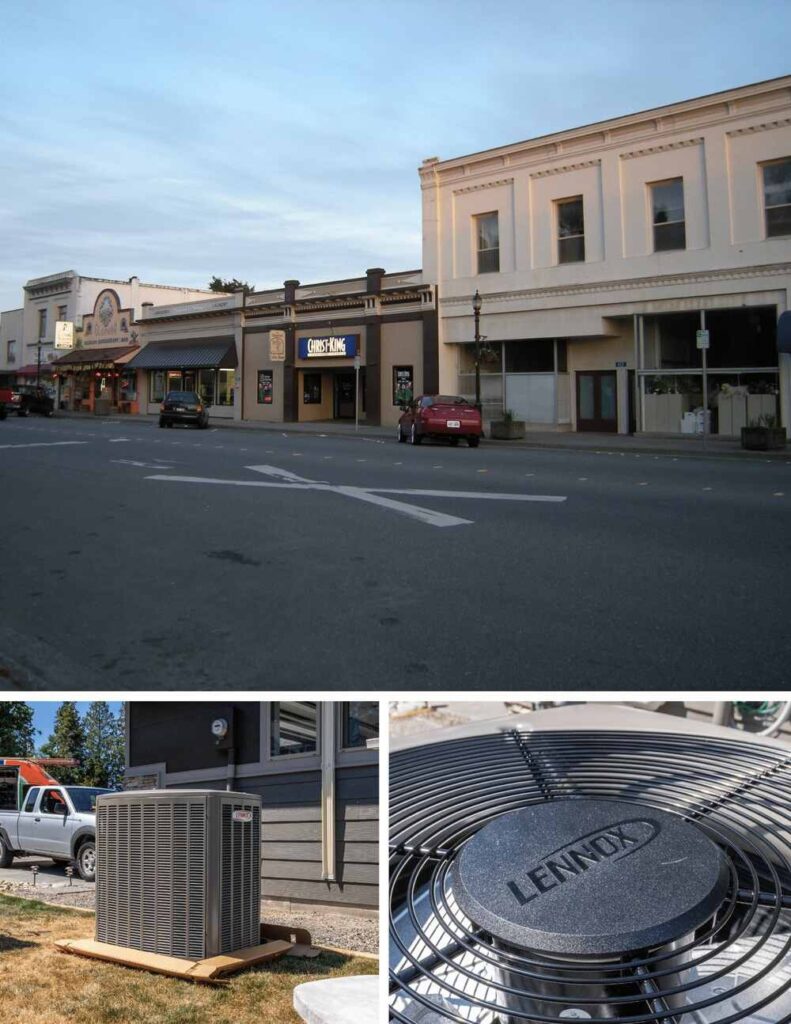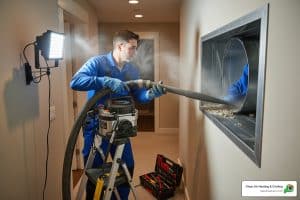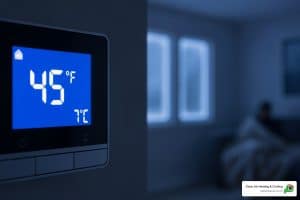Why Bellingham HVAC Air Conditioning Matters
Bellingham HVAC air conditioning is crucial for keeping your home comfortable and efficient, especially given Bellingham’s varied climate. Whether you’re dealing with summer heat or winter chill, a reliable air conditioning system ensures your indoor environment stays pleasant year-round.
Key Points on Bellingham HVAC Air Conditioning:
- Installation: Tailor your system to your home’s size and energy needs.
- Maintenance: Regular upkeep prevents breakdowns and extends lifespan.
- Repair: Swift fixes for common issues like thermostat malfunctions and refrigerant leaks.
Bellingham experiences a mix of hot summers and cold winters, emphasizing the need for a dependable HVAC system. Investing in a high-quality system and maintaining it properly can significantly reduce your energy bills and improve your home’s air quality.

Understanding HVAC Systems
Types of HVAC Systems
When it comes to Bellingham HVAC air conditioning, understanding the different types of systems is crucial. HVAC stands for heating, ventilation, and air conditioning, and these systems are designed to manage your home’s air quality and temperature year-round. Let’s break down the main types:
Ductless Mini-Splits: These systems are perfect for homes without existing ductwork. They consist of an outdoor unit connected to indoor air handlers, providing efficient cooling and heating. Brands like Fujitsu and Daikin offer high-efficiency models that can save you up to 30% on energy bills.
Central Air Systems: These are the most common type of HVAC systems. They use a network of ducts to distribute conditioned air throughout your home. Central air systems are ideal for larger homes and can be combined with heating systems for year-round comfort.
Heat Pumps: These versatile systems can both heat and cool your home. They work by transferring heat from the outside air to the inside during winter, and vice versa during summer. Heat pumps are energy-efficient and can significantly reduce your energy costs.
Benefits of Modern HVAC Systems
Modern HVAC systems come with a host of benefits that make them a smart investment for any homeowner:
Energy Efficiency: Today’s HVAC systems are designed to be highly energy-efficient. For example, Fujitsu’s ductless mini-splits boast a 99.7% equipment performance rate, ensuring you get the most out of every watt of electricity. This translates to lower energy bills and a reduced carbon footprint.
Cost Savings: While the initial investment in a modern HVAC system can be significant, the long-term savings are substantial. Efficient systems reduce energy consumption, which lowers your monthly utility bills. Additionally, regular maintenance can extend the life of your system, saving you money on costly repairs and replacements.
Improved Air Quality: Modern HVAC systems are equipped with advanced filtration systems that remove dust, pollen, and other allergens from the air. This is especially important in Bellingham, where seasonal changes can bring about various allergens. Improved air quality means a healthier living environment for you and your family.

Components of HVAC Systems
Understanding the basic components of an HVAC system can help you make informed decisions about installation and maintenance:
- Air Handler Unit (AHU): This component circulates air throughout your home. It can include a blower, heating or cooling elements, and filters.
- Thermostat: This is the control center of your HVAC system. Modern thermostats are programmable and can be controlled remotely via smartphone apps.
- Filters: These are crucial for maintaining air quality. They trap dust, pollen, and other particles, preventing them from circulating in your home.
- Dampers/Vents: These control the flow of air into different areas of your home, ensuring even distribution of heating or cooling.
- Refrigerant Lines: These carry refrigerant between the indoor and outdoor units in systems like ductless mini-splits and central air conditioners.
By understanding these components and the benefits of modern HVAC systems, you can make better decisions about your home’s heating and cooling needs. This knowledge will also help you maintain your system more effectively, ensuring it runs efficiently for years to come.
Next, we’ll dive into Installation Tips for Bellingham HVAC Air Conditioning, covering everything from pre-installation considerations to choosing the right system and the importance of professional installation.
Installation Tips for Bellingham HVAC Air Conditioning
Choosing the Right System
Before you install an HVAC system, consider several factors to ensure you make the best choice for your home. Here are some pre-installation considerations:
- Home Size: The size of your home plays a crucial role in selecting the right HVAC system. A system that’s too small won’t cool your home effectively, while one that’s too large will cycle on and off too frequently, wasting energy.
- Energy Efficiency: Look for systems with high SEER (Seasonal Energy Efficiency Ratio) ratings. Higher SEER ratings mean better energy efficiency, which translates to lower utility bills. Brands like Fujitsu and Daikin are known for their high-efficiency models.
- Budget: While it’s tempting to go for the cheapest option, investing in a high-quality system can save you money in the long run through lower energy costs and fewer repairs. Consider the total cost of ownership, including maintenance and potential repairs.
Professional Installation
Once you’ve chosen the right system, professional installation is crucial for optimal performance and longevity. Here are some key points to keep in mind:
- Importance of Certified Technicians: Always hire certified technicians for the installation. In Washington, HVAC service providers are required to have proper licensing. Certified technicians ensure that the installation meets all safety and efficiency standards.
- Installation Process: Professional installers will handle everything from placing the indoor and outdoor units to connecting the system to your home’s electrical and ductwork. They also perform pressure testing and proper commissioning to ensure the system operates at peak efficiency.
- Warranties: Make sure to ask about warranties. Most reputable HVAC brands offer warranties that cover parts and labor for a certain period. A good warranty can save you significant money on repairs down the line.
By considering these factors and opting for professional installation, you can ensure that your Bellingham HVAC air conditioning system runs efficiently and effectively, keeping your home comfortable year-round.
Next, we’ll explore Maintenance Tips for Optimal Performance, including routine maintenance and seasonal checks to keep your system in top shape.
Maintenance Tips for Optimal Performance
Routine Maintenance
Taking care of your HVAC system isn’t just a one-time task. Regular upkeep is key to keeping it running smoothly and efficiently.
Filter Replacement: Clogged filters can restrict airflow, making your system work harder and less efficiently. Replace or clean filters every 1-3 months, especially during peak usage seasons.
Cleaning Coils: Dirty coils reduce the system’s ability to cool your home. Clean both the evaporator and condenser coils at least once a year. This simple task can improve efficiency and extend the life of your system.
Checking Refrigerant Levels: Low refrigerant levels can lead to poor cooling performance and higher energy bills. Check the levels regularly and top up if necessary. If you notice a significant drop, there might be a leak that needs professional attention.
Seasonal Checks
Seasonal checks are essential to prepare your Bellingham HVAC air conditioning system for the changing weather.
Pre-Summer Inspection: Before the hot weather hits, schedule a pre-summer inspection. This includes checking the thermostat settings, tightening electrical connections, and lubricating moving parts. Ensure the system is ready to handle the increased load.
Pre-Winter Inspection: Even if you primarily use your HVAC system for cooling, a pre-winter check is still important. Inspect the heat exchanger for cracks, check the burner and ignition system, and ensure the system is safe and ready for any unexpected cold snaps.
Professional Tune-Ups: While DIY maintenance is helpful, professional tune-ups are crucial for a thorough check. Technicians can perform in-depth inspections, identify potential issues, and make necessary adjustments. Regular professional maintenance can prevent costly repairs and extend the life of your HVAC system.
By following these routine and seasonal maintenance tips, you can keep your Bellingham HVAC air conditioning system in optimal condition, ensuring comfort and efficiency year-round.
Next, we’ll delve into Repair Tips and Common Issues to help you troubleshoot and resolve any problems that arise.
Repair Tips and Common Issues
Common HVAC Issues
Even with regular maintenance, HVAC systems can develop problems. Here are some common issues you might encounter:
Thermostat Problems
A malfunctioning thermostat can cause your HVAC system to behave erratically. If your system turns on and off frequently or doesn’t reach the desired temperature, the thermostat might be the culprit. Ensure it’s set correctly and replace the batteries. If problems persist, it may need recalibration or replacement.
Refrigerant Leaks
Refrigerant is vital for cooling. If your system is low on refrigerant, it won’t cool efficiently. Signs of a leak include warm air blowing from vents and hissing sounds near the unit. Low refrigerant can also cause the evaporator coil to freeze, leading to more significant issues. Leaks should always be handled by a professional due to the chemicals involved.
Airflow Issues
Poor airflow can stem from various problems. Clogged filters, blocked vents, or ductwork leaks can all restrict airflow. Common signs include uneven cooling and weak air from vents. Regularly checking and replacing filters, and ensuring vents are open and unobstructed, can help. If the issue persists, ductwork might need inspection and sealing.
When to Call a Professional
Knowing when to call a professional can save you time and prevent further damage. Here are some signs it’s time to get expert help:
Signs of Serious Issues
- System Blows Warm Air: If your system blows warm air when it should be cooling, it could be due to a malfunctioning compressor or refrigerant leak.
- High Energy Bills: Unexplained spikes in energy bills often indicate inefficiencies within your HVAC system.
- Visible Leaks or Moisture: Water pooling around the unit or visible leaks can lead to damage and mold growth.
Benefits of Professional Repair
Professionals have the expertise and tools to diagnose and fix issues accurately. They can also perform thorough inspections to identify potential problems before they become serious. This not only ensures your system runs efficiently but also extends its lifespan.
Emergency Services
Some HVAC issues can’t wait. If your system stops working during extreme weather, it’s crucial to get it repaired immediately. Many HVAC companies offer 24/7 emergency services to ensure you’re never left in the heat or cold for long.
By understanding these common issues and knowing when to call a professional, you can keep your Bellingham HVAC air conditioning system running smoothly and efficiently.
Next, we’ll answer some frequently asked questions about HVAC systems to help you make informed decisions about your home’s comfort.
Frequently Asked Questions about Bellingham HVAC Air Conditioning
What are the signs that my HVAC system needs repair?
There are several warning signs that your HVAC system might need professional attention:
- Unusual Noises: If you hear grinding, squealing, or banging sounds, it could indicate a mechanical issue.
- Inconsistent Temperatures: If some rooms are too hot or too cold, your system might not be distributing air properly.
- High Energy Bills: A sudden spike in energy costs can signal that your HVAC system is working harder than it should.
- Frequent Cycling: If your system turns on and off frequently, it might be struggling to maintain the set temperature.
- Poor Air Quality: Increased dust, humidity, or allergy symptoms can indicate that your system isn’t filtering air effectively.
If you notice any of these signs, it’s best to call a professional for a thorough inspection and repair.
How often should I schedule maintenance for my HVAC system?
Regular maintenance is key to keeping your HVAC system in top shape. Here’s a simple schedule to follow:
- Twice a Year: Schedule professional maintenance in the spring and fall. This ensures your system is ready for the extreme temperatures of summer and winter.
- Monthly: Check and replace air filters if they are dirty. Clean filters improve efficiency and air quality.
- Seasonal: Before summer, inspect your air conditioning unit. Before winter, check your heating system.
By sticking to this maintenance schedule, you can extend the life of your system and prevent costly repairs.
What are the benefits of a ductless mini-split system?
Ductless mini-split systems offer several advantages:
- Energy Efficiency: These systems are highly efficient, often resulting in lower energy bills.
- Flexibility: They can be installed in various locations without the need for ductwork, making them ideal for older homes or additions.
- Improved Air Quality: Ductless systems reduce the risk of dust and allergens circulating through ductwork.
- Quiet Operation: Mini-splits are quieter than traditional HVAC systems, providing a more comfortable living environment.
- Zoned Heating and Cooling: You can control the temperature in individual rooms, increasing comfort and saving energy.
If you’re considering an upgrade, a ductless mini-split system could be a smart choice for your Bellingham HVAC air conditioning needs.
Next, we’ll wrap up with a summary and some final thoughts on the importance of regular maintenance for your HVAC system.
Year-Round Comfort with Clean Air Heating & Cooling
In summary, having a well-functioning HVAC system is essential for maintaining comfort in your home, especially in Bellingham’s varied climate. Whether you’re considering a new installation, keeping up with routine maintenance, or facing unexpected repairs, understanding your HVAC system is key to ensuring it operates efficiently and effectively.
Regular maintenance is crucial. It helps prevent major issues, extends the lifespan of your system, and keeps your energy bills in check. Simple tasks like replacing filters, cleaning coils, and scheduling seasonal checks can make a big difference. For more complex tasks, always rely on professional services to avoid costly mistakes.
At Clean Air Heating & Cooling, our goal is to provide top-notch HVAC services to the Bellingham community. From installation to maintenance and repair, we strive to ensure your system runs smoothly all year round. Our team of certified technicians is committed to delivering excellent service and personalized solutions to meet your needs.
Don’t wait until it’s too late. Schedule your routine maintenance or get a free estimate for a new installation today. Visit our Bellingham HVAC services page to learn more.
Your comfort is our priority. Let us help you stay cool in the summer and warm in the winter with our expert HVAC services.





